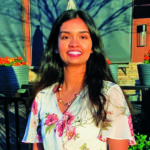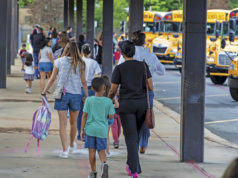By Katherine Michalak
Early this spring, COVID-19 news reports waylaid the entire country as various statistics trickled into the public domain. The onslaught of data soon alerted school systems about the severity of the illness and the potential for spreading amongst students. At first, the threat of a coronavirus outbreak seemed somewhat nebulous with serious cases clustered overseas, but education professionals watched scientific models intently and heeded early warnings. Here in Cobb County, an educational system known for outstanding commitment to the entire community, rose to the occasion to meet an unprecedented challenge and reveal a resolute fortitude.
Taking Notes
The initial intimation of health concerns in schools elicited a theoretical approach that could be similar to that taken for extreme weather emergencies — a short physical break from the classroom while students continued with assignments and projects already in progress. But soon, it was apparent that facing a full-blown pandemic called for an entirely unique protocol.
“Everything about this situation is complicated and serious,” confirms Cobb County School Superintendent Chris Ragsdale. “The most important [aspect] has been keeping every plan, scenario, and conversation based on student needs, not based on adult pressures. Our team was definitely prepared to keep students at the center of our response and that is the most important part. Certainly, none of us were really prepared for a public health pandemic to shut down school buildings overnight.”
The idea of tertiary exposure through global transportation lines presented early concerns as administrators considered the wider context of local schools. Honey Brannon, director of communications and marketing for Smyrna’s Whitefield Academy recalls that just before their spring break in early March, they’d heard about the increasing threat abroad. “We were thinking about the travel aspect and organized a team within the school to brainstorm about the possible impact,” she said. “Prior to returning back from spring break was our first communication with the extended school community.”
Evaluation of available at-home resources for students pushed forward as an immediate consideration in transitioning curriculum out of the classroom. Jen Brock, executive director of communications for Marietta City Schools, pointed out that because it’s a smaller school district with a network of eight elementary schools feeding into one sixth-grade academy, one middle and one high school, they’ve been able to maintain good contact with students after quickly addressing their families’ access to technology. “Online learning is only as good as the ability to communicate with the kid,” Brock said. “Our most immediate challenge was getting kids online — laptops, Chromebooks, tablets, smartphones. Comcast started to supply free service, but we worried about how to get families set up.”
Study Skills
Despite the initial difficulties, schools promptly shifted into high gear, finding solutions to these new problems, getting creative with versatile approaches to instruction, and addressing an unprecedented catalogue of out-of-classroom needs as families quarantined together.
“Our teachers, school leaders, staff, and district leaders did everything they possibly could to meet the needs of students and families which changed, literally overnight. And they continue to do so,” explains Ragsdale. “I have been incredibly thankful to see our entire community rally … [Cobb Schools Foundation] raised over $200,000 for devices for students who did not have one at home. …Our community has helped serve over 300,000 meals for students whose primary food source is a school building. In a way most communities cannot say, our schools are the backbone of our community and our community is the backbone of our schools.”
Brock agrees, “When our doors close, our kitchens close, and a hungry child cannot learn. We sent meals out on our buses with the bus drivers, delivering almost 250,000 meals to the regular bus stops. Parents were happy to get food, but the kids were excited to wave at their bus driver! We also put hotspots on a handful of buses which could then travel to certain spots [for students to use] … Bus drivers could answer questions about how to log on correctly and answer other questions.”
Progress Reports
Maintaining connection with students presented a potential setback when following safe-distancing guidelines to mitigate the spread of the virus, yet remained a crucial element of effective education. These education professionals cleared that hurdle time and again with novel methods for reaching their pupils.
“Teachers and faculty, and even principals, have been calling around and making sure that kids were okay,” Brock said. “The ever-changing guidelines seem daunting. We’re really listening to input, and polling staff, faculty, parents, and kids to get honest answers about what works and what doesn’t.” Superintendent Ragsdale expressed praise for enthusiastic educators: “There are so many, I do not want to highlight one without being able to highlight them all. There is a new story of a teacher impacting the lives of our students every day on our social media feeds and on our website. Just last month, over 7,000,000 people saw or read a story about how Cobb teachers get creative and inspire students.”
At Whitefield, a faith-based, covenant Christian school, establishing a way to implement a spiritual platform ranked preeminently. Brannon lauds the extensive school involvement, which achieved that goal far beyond what they hoped. “Everyone rallies around a focus of training the students in an uplifting way,” she said. “Teachers give morning devotionals through Zoom and Google Classroom, a daily email sends a friendly face with inspiration/motivation to keep everyone going, our Whitefield Community Journal reaches out to our entire community — faculty, board, staff, students, parents, grandparents, teachers, alumni — posting stories from individuals.”
Homework
Necessity has long been the mother of invention, and the educational alternatives explored during this health crisis preview a possible lead to long-term shifts in instruction. When educational support teams assess measures taken at this juncture, they also gauge future strategies for evolving learning models. Ragsdale clarifies the County’s position saying: “Before anyone had heard of COVID-19 and before school buildings in Cobb County were closed, we had begun implementing an education model which is less concerned with grades and formulas and more concerned with what parents care about — knowing what your student knows and supporting what they do not. We have been committed to supporting the transition from ‘education’ to ‘learning.’ As a big part of our COVID-19 response, we are more committed than ever to learning, which is less concerned with where and how, and more with if students are learning and what we are doing to support learning.”
“Some kids did very well and some didn’t, which forces all of us to address whether we shift a paradigm of education,” Brock added. “It’s showing us that there are many ways to use technology in a positive way, as well as to value human connection/conversation. School is often the one constant for the student and now that’s changed. As we prioritize the education of our children and the safety of our community, we ask parents for partnership, trust, and grace — we will do the best we can with what we know, while fully admitting that we don’t have all the answers.”
Whitefield acknowledges that the situation affects how the school moves forward academically. Administrators plan to use this experience to examine what works for individual students. “Because we are a private school that runs PreK-12, we see the issues and have the unique opportunities to see the various impacts even within the same family,” Brannon contends. “Our new lower-school building is scheduled to open this fall and we hope to celebrate that within these new parameters.”
Final Lessons
Teachable moments surged in torrents during these difficult times, but Cobb educators view the deluge as a fount from which students will sip for years to come. “A big lesson in this,” says Brock, “is that we don’t always know what’s going to happen and we need to be agile.”
Ragsdale agrees, “I think students have already shown they have learned the lesson we all talked about before the pandemic and that is resilience. It is important to learn, but it is more important to be ready and able to use what you know in a world which is rapidly changing … a lesson many adults take a lifetime to learn.”
Brannon repeats the message that her school has been able to convey about the unconditional nature of personal faith: “Even without being able to gather together as a physical group, we’ve sent out loving care to the community — all with the focus of our faith in Jesus Christ. Most of our community knew this, because that is why they chose Whitefield, but they weren’t aware how deep it ran and how fully we would be able to offer that.”
Class Dismissed
As we look to the immediate future with hope for a return to a routine, Cobb students and teachers encourage us all with their irrepressible spirit. Our “new normal’ can be glimpsed through the positivity of dedicated professionals and enterprising youth ready to turn an unexpected predicament into a promising new perspective.
————
 Campbell High School’s Sakshi Joshi Wins ‘A. Max Bacon Award’
Campbell High School’s Sakshi Joshi Wins ‘A. Max Bacon Award’
Campbell High School student Sakshi Joshi has won the A. Max Bacon Award for student leadership. The award, named in honor of former Smyrna Mayor Max Bacon, was presented to Joshi for exhibiting leadership and a love of community. “We are excited to present this award to a lady who served in roles for Mayor pro-team for Smyrna Youth Council and a committee chair for Student Government Association,” said Georgia Sangster, financial consultant with Stone & Birch Consulting, and a member of the award nominating committee. “She worked with students across Cobb County in order to learn more about the government that leads this city, its departments, and met with many local leaders. Upon COVID-19, and seeing the impact on the community, the members of Smyrna Youth Council worked to contact local businesses about their available resources. Max Bacon cares deeply for his local business and Smyrna’s ever-growing ambition, which is why Sakshi Joshi has earned her award as someone who demonstrates the spirit of leadership as Max Bacon.”




